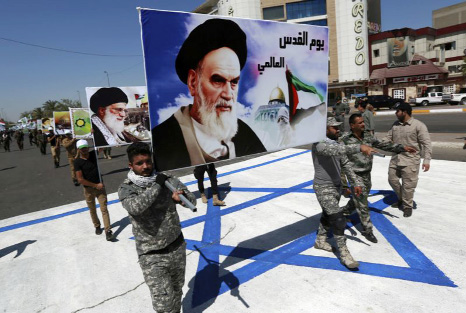
AP, Beirut :
There may not be much Iran can do about President Donald Trump’s withdrawal from the nuclear deal, but across the Middle East, it has a variety of ways it can hit back at the United States and America’s regional allies.
Iran has expanded its influence far beyond its borders in recent years, sponsoring an army of tens of thousands of Shiite militiamen spread across Iraq and Syria, all the way to Lebanon. A rocket attack overnight on Israeli positions in the Golan Heights may have been a first salvo, underscoring Tehran’s reach. Israel responded with a blistering wave of missile strikes early Thursday.
Iran also holds enormous political sway in neighboring Iraq and in Lebanon, where its main Shiite ally, the militant Hezbollah group, scored significant gains in weekend elections. In Iraq, two powerful political alliances expected to win seats in parliamentary elections on Sunday also maintain strong ties to Iran. In his speech announcing the U.S. withdrawal from the landmark 2015 nuclear deal, Trump called Iran the “world’s leading state sponsor of terror,” citing its support for “terrorist” proxies and militias such as Hezbollah and Hamas, as well as its activities in Yemen.
The rivalry between Iran and Saudi Arabia has torn the region apart, playing out on regional battlefields and fanning sectarian flames in Iraq, Syria, Lebanon, Bahrain and Yemen. Trump’s decision will likely intensify those confrontations, and could also embolden Israel to step up its own proxy battles against Tehran. Here is a look at proxy battlefields in Iran’s looming confrontation with the U.S., Saudi Arabia and Israel:
Any confrontation between Iran and Israel is likely to play out first and foremost on the battlefields of Syria, where Iran has built an extensive network of militias during Syria’s civil war. Advisers from Iran’s elite Revolutionary Guards, as well as trainers, commanders and experts, are stationed in military bases across the country.
It also has spy drones that it can use to attack from the sky. In February, Israel shot down what it said was a drone that contained explosives sent by Iran from an air base in Syria, prompting Israeli airstrikes that killed at least seven Iranians. An Israeli warplane was shot down during the battle.
Israel’s main concern is southern Syria, near the Israeli-controlled Golan Heights, where Tehran has been boosting its presence for years and where it could launch rocket attacks into Israeli territory.
Israel has said it will do what it takes to fend off Iran’s military entrenchment. A series of strikes over the last few months – all blamed on Israel – have struck Iranian assets in Syria and killed Iranian forces there.
The strikes have prompted threats of retaliation from Tehran, and Israel has girded for a response, ordering bomb shelters open in the Golan.
There may not be much Iran can do about President Donald Trump’s withdrawal from the nuclear deal, but across the Middle East, it has a variety of ways it can hit back at the United States and America’s regional allies.
Iran has expanded its influence far beyond its borders in recent years, sponsoring an army of tens of thousands of Shiite militiamen spread across Iraq and Syria, all the way to Lebanon. A rocket attack overnight on Israeli positions in the Golan Heights may have been a first salvo, underscoring Tehran’s reach. Israel responded with a blistering wave of missile strikes early Thursday.
Iran also holds enormous political sway in neighboring Iraq and in Lebanon, where its main Shiite ally, the militant Hezbollah group, scored significant gains in weekend elections. In Iraq, two powerful political alliances expected to win seats in parliamentary elections on Sunday also maintain strong ties to Iran. In his speech announcing the U.S. withdrawal from the landmark 2015 nuclear deal, Trump called Iran the “world’s leading state sponsor of terror,” citing its support for “terrorist” proxies and militias such as Hezbollah and Hamas, as well as its activities in Yemen.
The rivalry between Iran and Saudi Arabia has torn the region apart, playing out on regional battlefields and fanning sectarian flames in Iraq, Syria, Lebanon, Bahrain and Yemen. Trump’s decision will likely intensify those confrontations, and could also embolden Israel to step up its own proxy battles against Tehran. Here is a look at proxy battlefields in Iran’s looming confrontation with the U.S., Saudi Arabia and Israel:
Any confrontation between Iran and Israel is likely to play out first and foremost on the battlefields of Syria, where Iran has built an extensive network of militias during Syria’s civil war. Advisers from Iran’s elite Revolutionary Guards, as well as trainers, commanders and experts, are stationed in military bases across the country.
It also has spy drones that it can use to attack from the sky. In February, Israel shot down what it said was a drone that contained explosives sent by Iran from an air base in Syria, prompting Israeli airstrikes that killed at least seven Iranians. An Israeli warplane was shot down during the battle.
Israel’s main concern is southern Syria, near the Israeli-controlled Golan Heights, where Tehran has been boosting its presence for years and where it could launch rocket attacks into Israeli territory.
Israel has said it will do what it takes to fend off Iran’s military entrenchment. A series of strikes over the last few months – all blamed on Israel – have struck Iranian assets in Syria and killed Iranian forces there.
The strikes have prompted threats of retaliation from Tehran, and Israel has girded for a response, ordering bomb shelters open in the Golan.

